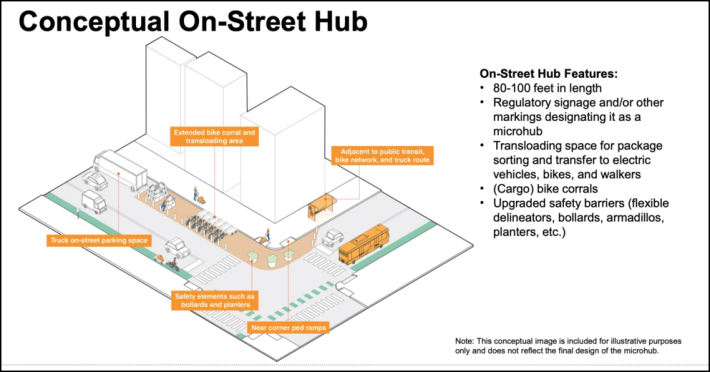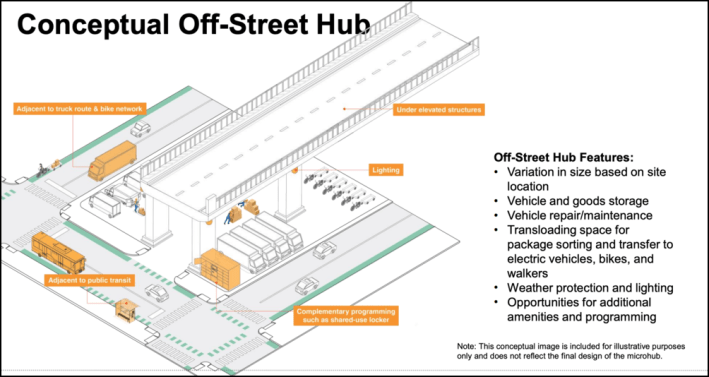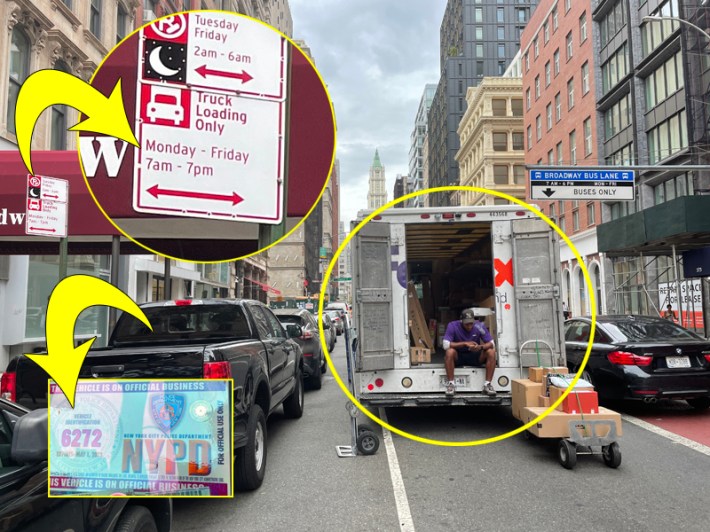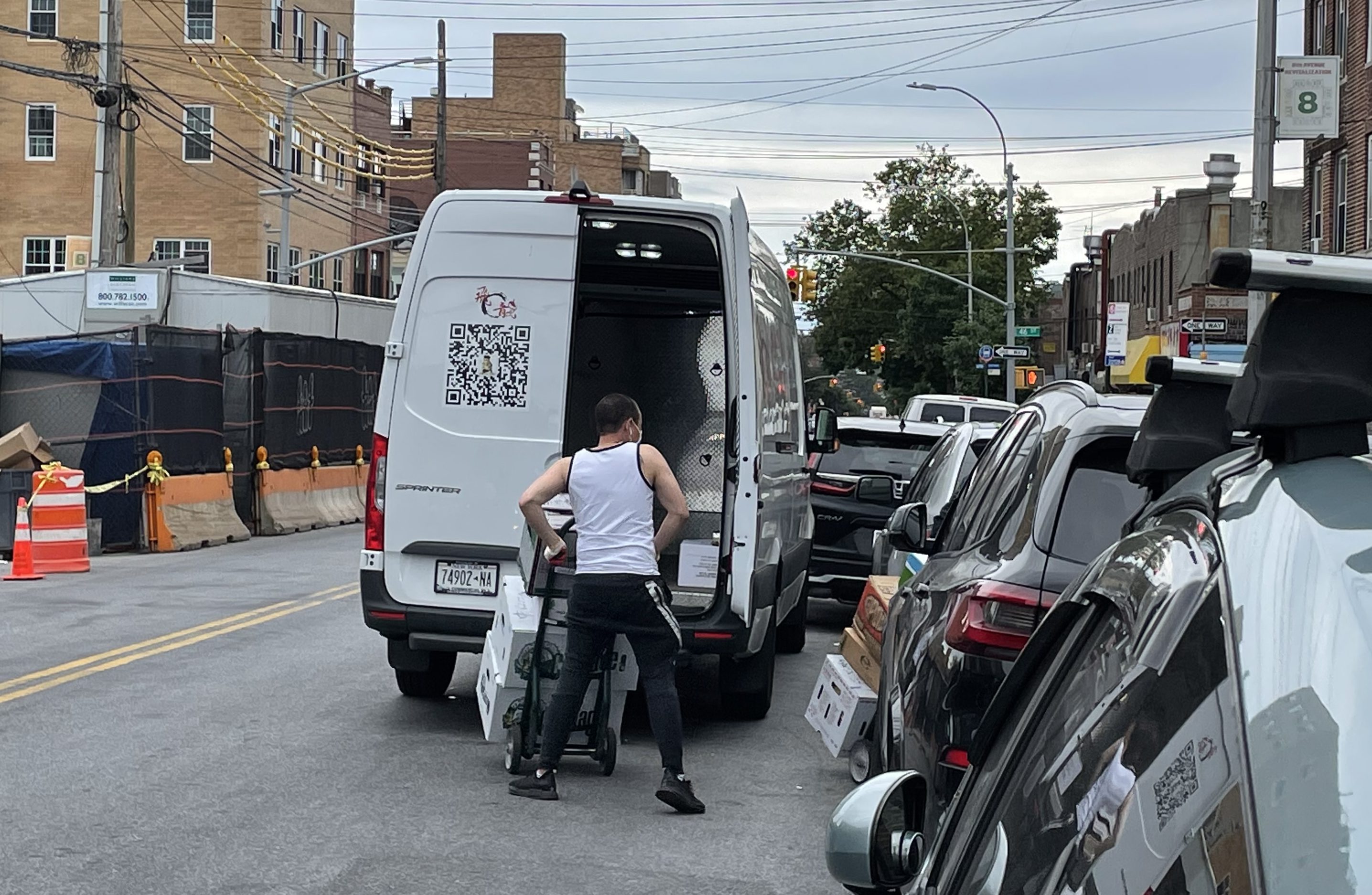New York City will take a crack this summer at solving the dilemma of delivery trucks tying up city streets by creating as many as many as 20 "micro-delivery hubs" around the city, officials said Thursday.
The pilot program will set aside designated areas at curbside and off-street locations for truckers to unload packages which will then be delivered by workers on cargo bikes or other small vehicles, officials said.
"These hubs will help better organize last-mile deliveries and support small and large businesses’ economic recovery as we emerge from the pandemic," said DOT Commissioner Ydanis Rodriguez in a press release.
The new hubs should appear sometime this summer. Exact locations of the delivery centers have yet to be determined, but will be based on factors including proximity to bike lanes, truck routes and mass transit, consultation with freight companies and communities, and neighborhood density, officials said.
Curbside hubs will feature dedicated street space for trucks to park and unload goods into a staging area, also in the street, for delivery cyclists, according to a DOT rendering that also shows a bike corral for cargo bikes and safety measures to keep cars out like planters and plastic delineators:

For the off-street locations, the DOT's concept art shows the city carving out space under elevated highways where trucks can park and bikes can be loaded up — and possibly taking advantage of the additional space by including storage lockers for employees:

The three-year, two-phase pilot program is based off of feedback to a request for expressions of interest about micro-distribution hubs that the department put out last August. The RFEI received 23 responses, including from 11 freight companies.
In the first phase, between now and summer 2024, DOT will set up rules and fees for the program, build the initial hubs, look at usage and enforcement data to see how the first batch of the hubs get used, and work out the kinks around parking enforcement and how logistics companies use the hubs.
The second phase, from summer 2024 to fall 2026, will see the size of the program greatly expanded, setting the stage for a permanent program some time after 2026.
New York City's effort to create distribution hubs follows in the footsteps of other cities around the world including Philadelphia, Seattle, Washington, DC, London, Berlin and Paris. City officials will draw on the lessons they can learn from other cities that have tried out the relatively new concept, they said in a report released along with Thursday's announcement.
D.C. scrapped its curb management pilot because of "enforcement challenges," the report said — a major red flag for New York, parts of which are already so choked in placards that clearly marked loading zones are all but useless.

New York City officials in their report pointed to the recently expanded citywide carshare system for proof that they know how to manage a program that needs to keep the curb clear. A DOT study of the carshare program found just ten percent of users dealt with designated parking spaces being blocked when they tried to park their cars during the second year of the pilot, officials noted.
Truck traffic in New York City is expected to grow from 120,000 per day to close to 200,000 by 2045, bringing with it air quality impacts, pedestrian and cycling safety risks and clogged streets. The crushing growth of online package deliveries in the city — to some 2.3 million per day — has become a rallying point for street safety and environmental activists as well as various city and state elected officials concerned about emissions, traffic and parking.
State Senator Andrew Gounardes and Assembly Member Robert Carroll have each suggested taxing packages as a way to curb the city's insatiable appetite for same-day delivery or at least pay for the infrastructure impacts the increase in truck traffic has caused. Manhattan Borough President Mark Levine made delivery microhubs part of his campaign for his current position, and commended the DOT for the upcoming pilot.
"Increasing the number of loading zones, transitioning to greener transportation methods, and activating off-street space for managing deliveries will make New York’s complex delivery network more sustainable, both environmentally and logistically,” Levine in a statement.
Other regulations floated by activists and electeds include rules on where the delivery hubs can be placed and what kinds of vehicles freight companies can use for last-mile trips. Some state legislators also want to fix state regulations to allow for 48-inch wide cargo bikes.
The city on Thursday said it will look at what it can do under its own authority to allow larger cargo bike sizes. The city is already rolling out wider bike lane designs, which can accommodate cargo bikes and an increase in both bike and e-bike traffic citywide.
The report released on Thursday was mandated by a 2021 law. Current council leadership praised its release.
"Every year roughly 1,400 lives are lost prematurely because of preventable air pollution exacerbated by the explosion of local truck traffic on city streets," City Council Transportation and Infrastructure Committee Chair Selvena Brooks-Powers said in a statement endorsing DOT's new program.
"New Yorkers are counting on us to create new, long-term, sustainable transportation infrastructure alternatives to allow goods to circulate in neighborhoods, while reducing the harmful environmental justice impacts of unnecessary truck traffic."






